Harm de Vries
SelfCodeAlign: Self-Alignment for Code Generation
Oct 31, 2024



Abstract:Instruction tuning is a supervised fine-tuning approach that significantly improves the ability of large language models (LLMs) to follow human instructions. We propose SelfCodeAlign, the first fully transparent and permissive pipeline for self-aligning code LLMs without extensive human annotations or distillation. SelfCodeAlign employs the same base model for inference throughout the data generation process. It first extracts diverse coding concepts from high-quality seed snippets to generate new tasks. It then samples multiple responses per task, pairs each with test cases, and validates them in a sandbox environment. Finally, passing examples are selected for instruction tuning. In our primary experiments, we use SelfCodeAlign with CodeQwen1.5-7B to generate a dataset of 74k instruction-response pairs. Finetuning on this dataset leads to a model that achieves a 67.1 pass@1 on HumanEval+, surpassing CodeLlama-70B-Instruct despite being ten times smaller. Across all benchmarks, this finetuned model consistently outperforms the original version trained with OctoPack, the previous state-of-the-art method for instruction tuning without human annotations or distillation. Additionally, we show that SelfCodeAlign is effective across LLMs of various sizes, from 3B to 33B, and that the base models can benefit more from alignment with their own data distribution. We further validate each component's effectiveness in our pipeline, showing that SelfCodeAlign outperforms both direct distillation from GPT-4o and leading GPT-3.5-based distillation methods, such as OSS-Instruct and Evol-Instruct. SelfCodeAlign has also led to the creation of StarCoder2-Instruct, the first fully transparent, permissively licensed, and self-aligned code LLM that achieves state-of-the-art coding performance.
BigCodeBench: Benchmarking Code Generation with Diverse Function Calls and Complex Instructions
Jun 26, 2024



Abstract:Automated software engineering has been greatly empowered by the recent advances in Large Language Models (LLMs) for programming. While current benchmarks have shown that LLMs can perform various software engineering tasks like human developers, the majority of their evaluations are limited to short and self-contained algorithmic tasks. Solving challenging and practical programming tasks requires the capability of utilizing diverse function calls as tools to efficiently implement functionalities like data analysis and web development. In addition, using multiple tools to solve a task needs compositional reasoning by accurately understanding complex instructions. Fulfilling both of these characteristics can pose a great challenge for LLMs. To assess how well LLMs can solve challenging and practical programming tasks, we introduce Bench, a benchmark that challenges LLMs to invoke multiple function calls as tools from 139 libraries and 7 domains for 1,140 fine-grained programming tasks. To evaluate LLMs rigorously, each programming task encompasses 5.6 test cases with an average branch coverage of 99%. In addition, we propose a natural-language-oriented variant of Bench, Benchi, that automatically transforms the original docstrings into short instructions only with essential information. Our extensive evaluation of 60 LLMs shows that LLMs are not yet capable of following complex instructions to use function calls precisely, with scores up to 60%, significantly lower than the human performance of 97%. The results underscore the need for further advancements in this area.
StarCoder 2 and The Stack v2: The Next Generation
Feb 29, 2024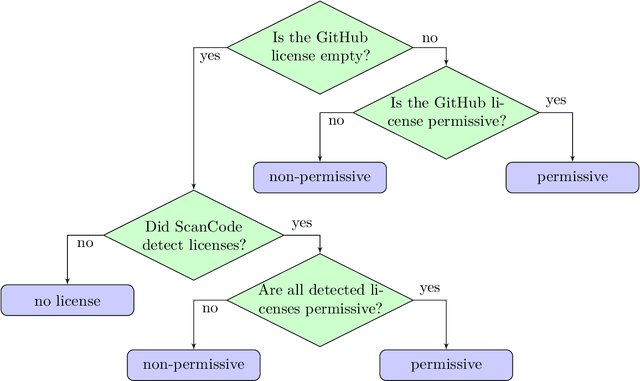
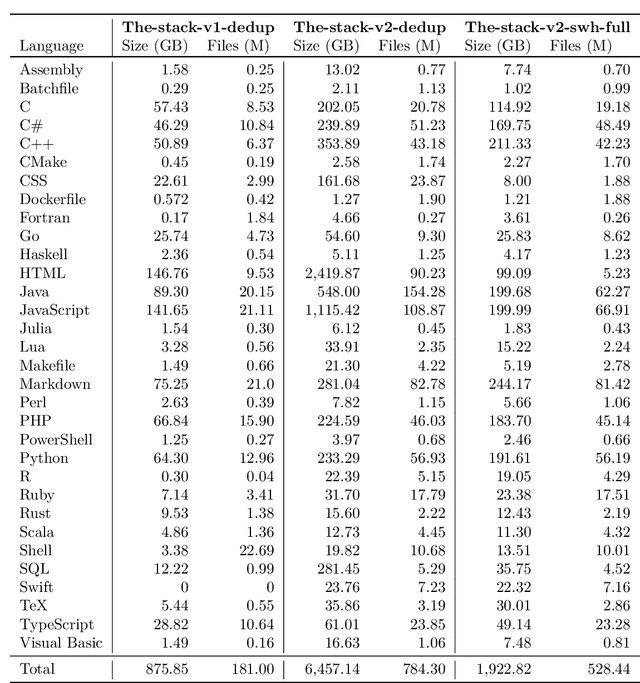
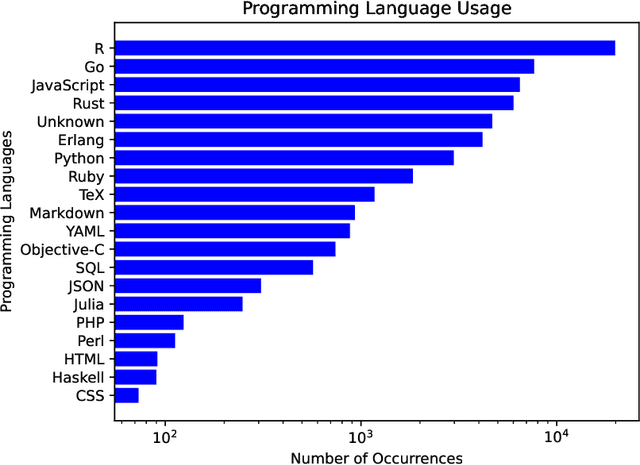
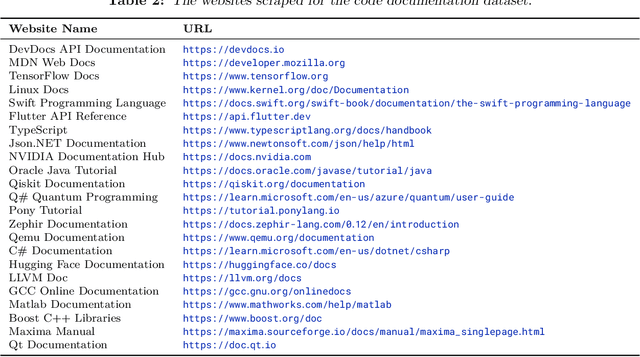
Abstract:The BigCode project, an open-scientific collaboration focused on the responsible development of Large Language Models for Code (Code LLMs), introduces StarCoder2. In partnership with Software Heritage (SWH), we build The Stack v2 on top of the digital commons of their source code archive. Alongside the SWH repositories spanning 619 programming languages, we carefully select other high-quality data sources, such as GitHub pull requests, Kaggle notebooks, and code documentation. This results in a training set that is 4x larger than the first StarCoder dataset. We train StarCoder2 models with 3B, 7B, and 15B parameters on 3.3 to 4.3 trillion tokens and thoroughly evaluate them on a comprehensive set of Code LLM benchmarks. We find that our small model, StarCoder2-3B, outperforms other Code LLMs of similar size on most benchmarks, and also outperforms StarCoderBase-15B. Our large model, StarCoder2- 15B, significantly outperforms other models of comparable size. In addition, it matches or outperforms CodeLlama-34B, a model more than twice its size. Although DeepSeekCoder- 33B is the best-performing model at code completion for high-resource languages, we find that StarCoder2-15B outperforms it on math and code reasoning benchmarks, as well as several low-resource languages. We make the model weights available under an OpenRAIL license and ensure full transparency regarding the training data by releasing the SoftWare Heritage persistent IDentifiers (SWHIDs) of the source code data.
Astraios: Parameter-Efficient Instruction Tuning Code Large Language Models
Jan 01, 2024Abstract:The high cost of full-parameter fine-tuning (FFT) of Large Language Models (LLMs) has led to a series of parameter-efficient fine-tuning (PEFT) methods. However, it remains unclear which methods provide the best cost-performance trade-off at different model scales. We introduce Astraios, a suite of 28 instruction-tuned OctoCoder models using 7 tuning methods and 4 model sizes up to 16 billion parameters. Through investigations across 5 tasks and 8 different datasets encompassing both code comprehension and code generation tasks, we find that FFT generally leads to the best downstream performance across all scales, and PEFT methods differ significantly in their efficacy based on the model scale. LoRA usually offers the most favorable trade-off between cost and performance. Further investigation into the effects of these methods on both model robustness and code security reveals that larger models tend to demonstrate reduced robustness and less security. At last, we explore the relationships among updated parameters, cross-entropy loss, and task performance. We find that the tuning effectiveness observed in small models generalizes well to larger models, and the validation loss in instruction tuning can be a reliable indicator of overall downstream performance.
The BigCode Project Governance Card
Dec 06, 2023Abstract:This document serves as an overview of the different mechanisms and areas of governance in the BigCode project. It aims to support transparency by providing relevant information about choices that were made during the project to the broader public, and to serve as an example of intentional governance of an open research project that future endeavors can leverage to shape their own approach. The first section, Project Structure, covers the project organization, its stated goals and values, its internal decision processes, and its funding and resources. The second section, Data and Model Governance, covers decisions relating to the questions of data subject consent, privacy, and model release.
RepoFusion: Training Code Models to Understand Your Repository
Jun 19, 2023



Abstract:Despite the huge success of Large Language Models (LLMs) in coding assistants like GitHub Copilot, these models struggle to understand the context present in the repository (e.g., imports, parent classes, files with similar names, etc.), thereby producing inaccurate code completions. This effect is more pronounced when using these assistants for repositories that the model has not seen during training, such as proprietary software or work-in-progress code projects. Recent work has shown the promise of using context from the repository during inference. In this work, we extend this idea and propose RepoFusion, a framework to train models to incorporate relevant repository context. Experiments on single-line code completion show that our models trained with repository context significantly outperform much larger code models as CodeGen-16B-multi ($\sim73\times$ larger) and closely match the performance of the $\sim 70\times$ larger StarCoderBase model that was trained with the Fill-in-the-Middle objective. We find these results to be a novel and compelling demonstration of the gains that training with repository context can bring. We carry out extensive ablation studies to investigate the impact of design choices such as context type, number of contexts, context length, and initialization within our framework. Lastly, we release Stack-Repo, a dataset of 200 Java repositories with permissive licenses and near-deduplicated files that are augmented with three types of repository contexts. Additionally, we are making available the code and trained checkpoints for our work. Our released resources can be found at \url{https://huggingface.co/RepoFusion}.
StarCoder: may the source be with you!
May 09, 2023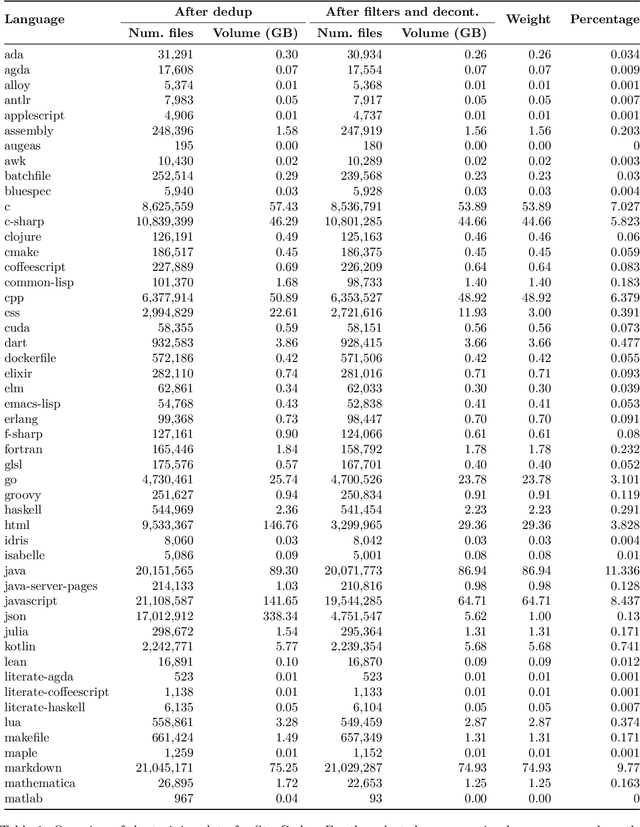
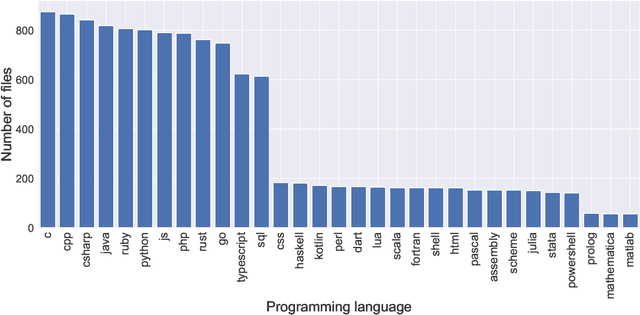
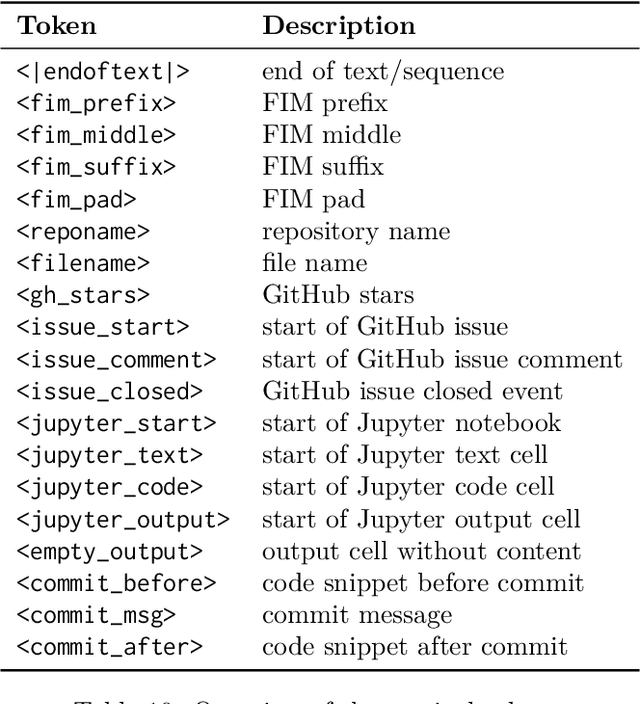
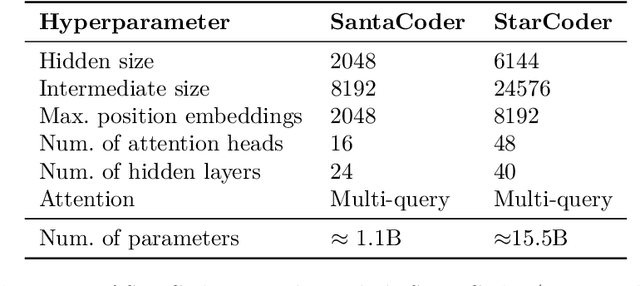
Abstract:The BigCode community, an open-scientific collaboration working on the responsible development of Large Language Models for Code (Code LLMs), introduces StarCoder and StarCoderBase: 15.5B parameter models with 8K context length, infilling capabilities and fast large-batch inference enabled by multi-query attention. StarCoderBase is trained on 1 trillion tokens sourced from The Stack, a large collection of permissively licensed GitHub repositories with inspection tools and an opt-out process. We fine-tuned StarCoderBase on 35B Python tokens, resulting in the creation of StarCoder. We perform the most comprehensive evaluation of Code LLMs to date and show that StarCoderBase outperforms every open Code LLM that supports multiple programming languages and matches or outperforms the OpenAI code-cushman-001 model. Furthermore, StarCoder outperforms every model that is fine-tuned on Python, can be prompted to achieve 40\% pass@1 on HumanEval, and still retains its performance on other programming languages. We take several important steps towards a safe open-access model release, including an improved PII redaction pipeline and a novel attribution tracing tool, and make the StarCoder models publicly available under a more commercially viable version of the Open Responsible AI Model license.
The StatCan Dialogue Dataset: Retrieving Data Tables through Conversations with Genuine Intents
Apr 05, 2023Abstract:We introduce the StatCan Dialogue Dataset consisting of 19,379 conversation turns between agents working at Statistics Canada and online users looking for published data tables. The conversations stem from genuine intents, are held in English or French, and lead to agents retrieving one of over 5000 complex data tables. Based on this dataset, we propose two tasks: (1) automatic retrieval of relevant tables based on a on-going conversation, and (2) automatic generation of appropriate agent responses at each turn. We investigate the difficulty of each task by establishing strong baselines. Our experiments on a temporal data split reveal that all models struggle to generalize to future conversations, as we observe a significant drop in performance across both tasks when we move from the validation to the test set. In addition, we find that response generation models struggle to decide when to return a table. Considering that the tasks pose significant challenges to existing models, we encourage the community to develop models for our task, which can be directly used to help knowledge workers find relevant tables for live chat users.
SantaCoder: don't reach for the stars!
Jan 09, 2023



Abstract:The BigCode project is an open-scientific collaboration working on the responsible development of large language models for code. This tech report describes the progress of the collaboration until December 2022, outlining the current state of the Personally Identifiable Information (PII) redaction pipeline, the experiments conducted to de-risk the model architecture, and the experiments investigating better preprocessing methods for the training data. We train 1.1B parameter models on the Java, JavaScript, and Python subsets of The Stack and evaluate them on the MultiPL-E text-to-code benchmark. We find that more aggressive filtering of near-duplicates can further boost performance and, surprisingly, that selecting files from repositories with 5+ GitHub stars deteriorates performance significantly. Our best model outperforms previous open-source multilingual code generation models (InCoder-6.7B and CodeGen-Multi-2.7B) in both left-to-right generation and infilling on the Java, JavaScript, and Python portions of MultiPL-E, despite being a substantially smaller model. All models are released under an OpenRAIL license at https://hf.co/bigcode.
The Stack: 3 TB of permissively licensed source code
Nov 20, 2022



Abstract:Large Language Models (LLMs) play an ever-increasing role in the field of Artificial Intelligence (AI)--not only for natural language processing but also for code understanding and generation. To stimulate open and responsible research on LLMs for code, we introduce The Stack, a 3.1 TB dataset consisting of permissively licensed source code in 30 programming languages. We describe how we collect the full dataset, construct a permissively licensed subset, present a data governance plan, discuss limitations, and show promising results on text2code benchmarks by training 350M-parameter decoders on different Python subsets. We find that (1) near-deduplicating the data significantly boosts performance across all experiments, and (2) it is possible to match previously reported HumanEval and MBPP performance using only permissively licensed data. We make the dataset available at https://hf.co/BigCode, provide a tool called "Am I in The Stack" (https://hf.co/spaces/bigcode/in-the-stack) for developers to search The Stack for copies of their code, and provide a process for code to be removed from the dataset by following the instructions at https://www.bigcode-project.org/docs/about/the-stack/.
 Add to Chrome
Add to Chrome Add to Firefox
Add to Firefox Add to Edge
Add to Edge